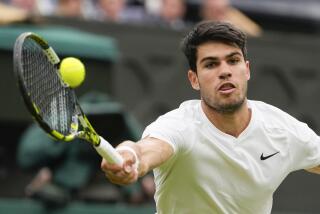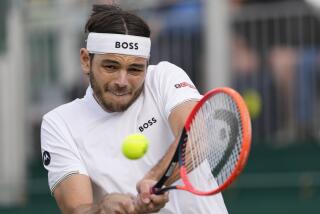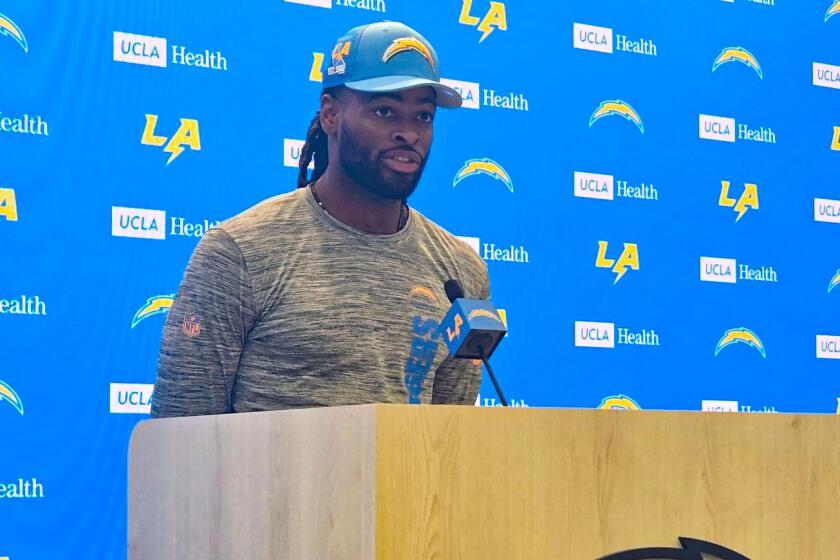Things Get Shaken, Stirred in Desert
- Share via
Indian Wells was turning into something of a jinxed venue and the trend only escalated Tuesday. Maybe Pete Sampras was right when he once joked about the desert curse.
Michael Chang’s farewell tour turned into a walk-on spot on the Stadium Court, three men retired from their matches because of gastrointestinal distress, one defending champion, Daniela Hantuchova of Slovakia, went out meekly in straight sets and another defending champion, Lleyton Hewitt, nearly exited in the first round. And, oh yes, there was an earthquake in the desert in the morning, registering a magnitude 4.6.
Leave it to Hewitt to emerge as the biggest survivor on a tumultuous day after so many failed at the Pacific Life Open.
There was a lot more on the line than a spot in the second round, as the top-seeded Hewitt saved three match points in the second set and defeated Younes El Aynaoui of Morocco, 4-6, 7-5, 6-2, in two hours 18 minutes.
The larger implications had to do with history, and a slice of the future.
History was in the form of El Aynaoui, who beat Hewitt in four sets in the fourth round at the Australian Open in January. The future had to do with a person not even playing at Indian Wells, the injured Andre Agassi.
Had Hewitt lost, Agassi would have become the new No. 1-ranked player in the ATP’s Entry Ranking system next week. Because he is the defending champion here, Hewitt needs to make the semifinals to stay No. 1.
El Aynaoui had three cracks at making it happen. The first match point came on Hewitt’s serve in the ninth game of the second set, but he saved it with a backhand winner down the line.
Two more opportunities arrived in the very next game with El Aynaoui serving at 5-4. At 40-30, he netted a forehand after a baseline rally, and two points later, Hewitt erased the third match point with a forehand passing shot down the line.
“I went for my shots on match point and it paid off,” Hewitt said. “You sort of live and die on the edge, I guess.
“I practiced that shot and it came off. A couple more inches wide or long, I could have been in a little trouble. Some days you have it, some days you don’t. I felt like nothing was going right today until the time where it sort of all turned around.”
He was right. Until then, El Aynaoui was the one getting the net-cord winners and favorable line calls, or at least it seemed that way to Hewitt, and it was starting to resemble Melbourne.
“It felt like he sort of just continued on his way, how he was playing so well in Australia against me in that match, and he continued exactly the same right from the word go today,” Hewitt said.
But, unlike the Australian Open, El Aynaoui wasn’t serving aces every other minute. He had 33 in that match and only three Tuesday. Hewitt had nine aces.
The shot-making produced between the two often hit a high level. Hewitt went tumbling to the hard court in the third game of the third set, making a diving backhand volley. The volley popped up and El Aynaoui had an open court and time to spare but pushed a forehand long.
Hewitt’s expression and double-take when the ball sailed long was priceless. Later, he needed treatment and a bag of ice from the trainer for his right leg and hip.
The passion and drive Hewitt displayed was missing from the other defending champion, Hantuchova. Amanda Coetzer of South Africa played her usual patient game from the baseline, beating the third-seeded Hantuchova, 6-4, 6-4, in the fourth round.
While it might look like a bad loss for the 19-year-old Hantuchova, the 31-year-old Coetzer has had something of a recent career resurgence, reaching the final in Memphis and winning the title in Acapulco.
“I have to give all the credit to Amanda, the way she was playing,” Hantuchova said. “She was almost not missing a ball at all.”
Coetzer, once ranked as high as No. 3, said of the win: “It really means a lot. Not only the wins, but I think just playing now at this stage. I really appreciate it probably more than I did a few years ago. I realize it’s not going to last forever.”
Coming to that realization were the likes of Chang and Goran Ivanisevic of Croatia. Gustavo Kuerten of Brazil beat the oft-injured Ivanisevic, 6-2, 6-4, in the first round and, as always, the 2001 Wimbledon champion, was his usual amusing self.
On his serving: “Second serve is very slow. I can go on the women’s tour with this second serve, I be OK.”
On playing Wimbledon again: “Even if I have to go in the wheelchair, I go there.”
On winning Wimbledon: “I think you can’t bargain with God. Is tough bargain. He gave me something I wanted all my life, and he has to take something in return.”
For a time, it looked as though the wild-card entrant, Chang, would not take a game off Carlos Moya, who won 6-0, 6-3. Even the fifth-seeded Moya started to wonder.
The Spaniard showed his usual class in letting Chang garner the applause afterward in what was his last appearance in this tournament. Chang, who won three times here, is retiring after this season.
Though it is several matches away, Moya had a strong opinion about the early start, 9:30, for the men’s final Sunday morning, a television-driven decision. He was a finalist here in 1999.
“I think it’s crazy,” Moya said, “There is not any other sport I know that they are playing so early, where you need to be 100% fit.”
The women’s quarterfinals were completed with top-seeded Kim Clijsters’ 6-3, 3-6, 6-1 win over Nathalie Dechy in the final match of the evening.
More to Read
Go beyond the scoreboard
Get the latest on L.A.'s teams in the daily Sports Report newsletter.
You may occasionally receive promotional content from the Los Angeles Times.











